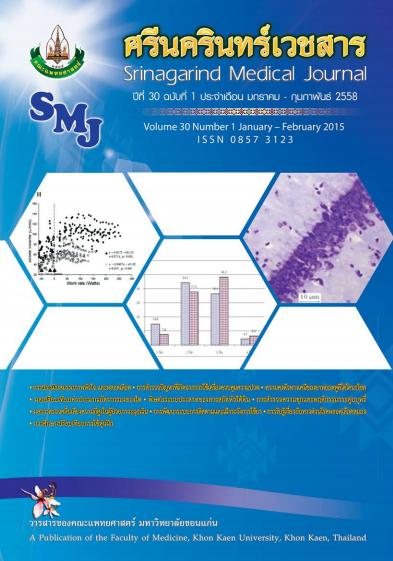A Survey of the Problems from the use of Self- Controlled Analgesia Devices of Patient in Srinagarind Hospital
Keywords:
Patient Controlled Analgesia devices, Problem, Acute Pain ServicesAbstract
Background and objective: Pain management by Patient-Controlled Analgesia (PCA) device can optimize pain control and increase patient satisfaction. Acute pain service, Department of Anesthesiology, Faculty of Medicine, Khon Kaen University still lacks information of PCA devices problems. This study aims to study rate and problems of PCA utility for improving our pain service.
Methods: Descriptive study from APS records in 1 year period between January and December 2010
Results: Four hundred and twenty seven of patients used PCA devices for pain control, 59.7% (255 patients) received intravenous PCA (IV-PCA) and 40.3% (172 patients) received Patient-Controlled Epidural Analgesia (PCEA). We found that 38.6% (95% CI 34.0, 43.4) stopped PCA devices before planning time for 53.9% (89 patients) and 46.1% (76 patients) in IV PCA and PCEA, respectively. The most common causes of early termination of IV PCA during the first three days of service were inadequate refilled medication by 65.4% (34 patients), 87.9% (43 patients) and 87.4% (14 patients), respectively. The second common causes in the first day was system error or downstream occlusion by 11.5% (6 patients). In early termination of PCEA, the most common cause during the first day was dislodging of epidural catheter (33.4%). There is no problem of PCA device associated with patient harm.
Conclusions: The common problems of PCA utility were inadequate refilled medication and dislodging of epidural catheter. We need to further develop the guidelines for proper pain management.




